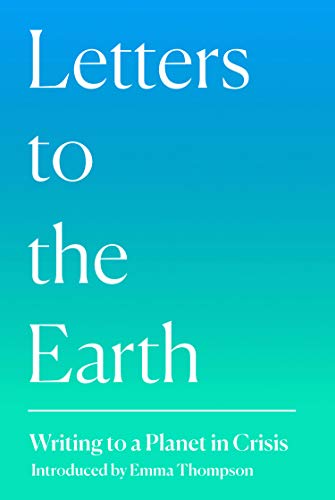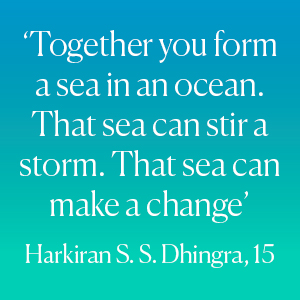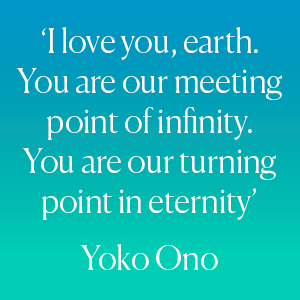
As a teen, I wore a T-shirt quoting Chief Seattle. ‘The Earth is
our mother,’ it said. ‘Man did not weave the web of life; he is
merely a strand in it. Whatever he does to the web, he does to
himself.’ Looking back, I can see how I turned away from the
depth and clarity of that insight. I listened to other stories of
my time – stories so commonplace that I did not even see them
as stories.
Professor Jem Bendell, from his essay, ‘Extinction Rebellion’.
Letters to the Earth: Writing to a Planet in Crisis (Harper Collins) is a collection of one hundred essays, written in response to the growing fears of climate change, global warming and concerns about how life for every inhabitant of our beautiful planet Earth may change quickly within future years, unless strong change and transformation is undertaken by the leaders of our world.
The key elements throughout each essay are awareness, education and genuine concerns for the future of – not just this current generation existing in 2021 – but for generations to come.
Each essay is thoughtfully forged and crafted, with the intention of spreading this awareness to every reader; to open our eyes, hearts and minds to the harrowing dangers which face our world.
Many of the essays originate from people within the public eye, or those with experienced opinions concerning various aspects of destructive climate change.
Others are powerful in their simplistic expression, such as Ollie Barnes, aged twelve – someone at an age likely to experience the potential worst elements of climate change throughout his life.
To the people who think that there’s no point in trying, to the
people who think that because we have done this we deserve
to suffer the consequences. There’s no point in giving up! In
the past we have decided to turn away from Mother Nature’s
screams but not today! We will not let the earth we live on be
destroyed so easily, we will try hard to save it from the very
threat we created and see the world for its glory and its beauty.
Don’t be the person who is standing back watching other
people as they do the work.
Join the fight to save our world. If you don’t then everything
that we love about the world will slowly disappear.
Ollie Barnes, from his essay, ‘Everything’.
Other essays within this mind-opening publication originate from very respected, academic sources, such as Professor Stefan Rahmstorf, a German oceanographer and climatologist and also Head of Earth System Analysis at the Potsdam Institute for Climate Impact Research.
Sometimes I have this dream.
I’m going for a hike and discover a remote farmhouse on
fire.
Children are calling for help from the upper windows. So I
call the fire brigade. But they don’t come, because some mad
person keeps telling them that it is a false alarm.
The situation is getting more and more desperate, but I
can’t convince the firemen to get going.
I cannot wake up from this nightmare.
Stefan Rahmstorf, from his essay, ‘False Alarm’.
While common expressive tones throughout each of the one hundred, separate voices within this book are strongly focused upon educative awareness, it’s also noticeable that these tones are also capable of expressing understandable elements of frustration and anger beneath the surface of the words employed, such as an essay from award-winning author, Matthew Todd, entitled ‘Sorry’.
What is it they say – ‘Sorry is the hardest word’?
Well, I’m sorry.
I am…
I’m sorry that I put my trust in the media that is more
obsessed with fashion and football, and reality TV, with where
the Dow Jones is, with game shows, with baking, with putting
a positive spin on 71 degree heat in February with a ‘Wow,
what a great opportunity for ice cream sellers’.
I’m sorry that when I first heard about what was happening,
I looked away…I heard someone
say on the radio news, on a Monday morning, that ‘Scientists
are concerned that the world is heating up due to a build-up of
so-called greenhouse gases emitted by the burning of fossil
fuels that may warm the earth to potentially dangerous levels,’
and I thought, That’s scary!
And then they added, ‘But there
is disagreement from other scientists who say, ‘There’s no
need to worry, it won’t happen for hundreds of years and will
most likely benefit the planet and make the UK as warm as the
Costa Del Sol.’
While these expressive, creative tones are naturally concentrated upon the frustrations that so many feel about a lacklustre response from the Earth’s nations, the words that flow from each author are also written to draw us into the full nature of what is being expressed, rather than any attempt to create separation or conflict. The commonly-used phrase (especially from the lips of politicians), ‘we are all in this together’ has perhaps never been more relevant when focusing upon the current world problem of climate change.

As an observer, I found myself nodding along with every part of this book, because – in the strictest terms of common sense and logical reasoning – it’s just really difficult not to.
These series of enlightening essays are written not only from emotive, caring hearts, but from cognitive, intelligent minds.
Each essay promotes open thought, and discussion; ultimately leaving the reader with a genuine sense of wondering when the leaders of our gorgeous home planet might do to tackle contemporary issues of climate change, thus addressing the fears of so many from within a global population of over seven billion people; their children, grandchildren and beyond.
They (the young) are our best hope and listening to them always makes
me feel powerful once again. Plugging into that energy will
recharge even the most tired of batteries.
Read this book and pass it on. Hand on your passion for the
planet to the next person and never, ever give in. Convert your
rage to action and your grief to love. I think the planet feels us
as we do this.
Perhaps it will even help us.
Emma Thompson, from the introduction to Letters to the Earth.

